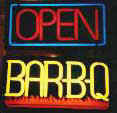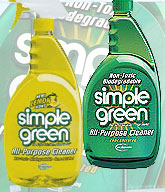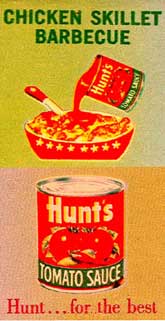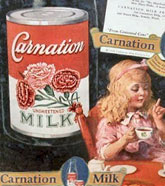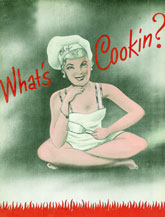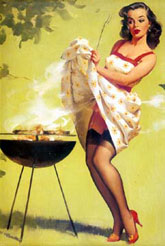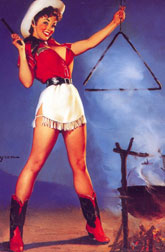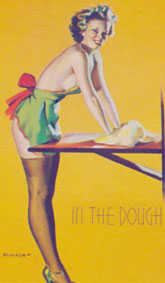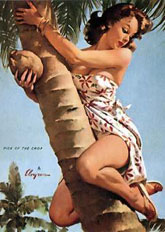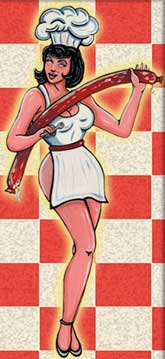Contact BBQbyDan
www.BBQDan.com
Search
KCBS BBQ Cook-Off Info
Recipes,
Smoking Meats
Recipes, Grilling
|
|
|
|
BBQbyDan
PORK SHOULDER BUTT SMOKING BASICS
Updated 04-September-2012
PACKAGING,
TYPES, AND PARTS OF A BUTT The words used in the world of butt are:
Boston
Butt, Butt, Shoulder, Picnic, what that basically means in the BBQ world, is: - The overall piece we derive the butt from is the pork shoulder, the front leg of the pig (the rear legs are the ham) - Divide the shoulder into two pieces, upper (shoulder part) and a lower (leg part)
-
Then you have the the two identified pieces. - The rear upper leg is not a butt, but is a ham. - I am guessing that the word "Boston" came about due to the butt being enjoyed and cooked in a particular fashion in Boston during our history and the term "butt" derived from the piece in question "butting against" the main body/torso of the pig. But am just guessing at that.
Don't know for a fact, but I hear there are 7 different muscles that come together in the butt that run all different directions. I also ALWAYS cook bone-in. I just don't like the moisture content (dry) when I cook bone-out, as an FYI.
The typical butt that you will find in a store come in various cuts, packages, and types.
- At Costco for example you will NOT always find the bone-in Butt in the counter for sale. However, it will be sold, or available, almost always. It will arrive to the stores in the cryopac packer package (what all meats come in from a slaughter house), 2 in a package, and will be sold to you typically in that fashion. Usually the butt weighs between 7.5 & 9 pounds (almost always 8.5lb) and sells typically at Costco for .99 - 1.49 cents per/lb. Due to the neighborhood your Costco is in they handle it differently. In my neighborhood the butchers open the package and slices the butts into strips. They then re-package and name them "Country Style Ribs". Even though they are not really a rib. They cook up nice and people like them a lot. I however usually just cook the whole butt. So, if I can catch them before they have sliced them all up they will walk into the back room and pick up a package/case and price it for me at the correct price of an un-cut butt.
- At Smart & Final, most supermarkets, and other stores, you will find
the butt typically comes in a cryopac package, a packer cut, and mostly
by the packing plant of Seaboard, IBP or Farmer John. I am more cautious of
Farmer John Pork in that it typically comes in a brine, or preservative
type liquid. That allows it probably a 3x shelf life in the
store. However, pork, unlike beef, will "turn" with
age. I use the word "turn" to mean it will smell bad and
the liquids/blood will become gooey like. This is undesirable and
unacceptable. Costco's supplier does not use a brine type preservative
(this is good).
So, beware of the expiration date on the packages. If it says a
week out it is probably good. If it says a month out then you know
it has to have a preservative as it could not last that long
otherwise. Also, the brine, when used with ribs, can actually
break down the meats. Don't know if you have every tried to remove
the membrane from a Farmer John Rib and found it just fell apart.
Well, that happened for a reason. So, just making everybody aware
of what is out there and go get what you want. Also if I
suspect a problem I will always slightly slice open the package of pork
with my pocket knife at the market
counter and smell it after the checker has rung it up. If it
smells fine, then no problem. I will take it like that. If
it has "turned" then I just hand it back for an exchange or refund.
There is no down side to this. You can tape it shut as home again,
freeze, or cook then and not worry about it. Believe it or not I
find a turned/spoiled Pork Butt this way 2-3 times out of 10 IF it has
been packaged in a brine. I can state here in the Los Angeles area I
will get a bad/turned piece of butt or rib 1-2 times out of 5.
VERY rarely will I find a problems if it is not packaged in a brine as
it is deliberately moved quicker. Also, the more food/meat a store
moves the less chance of a problem (like Costco). FYI, when I buy
butts (or ribs), even if using within a week, I will drop into a freezer
to stop the decomposition... thus they won't "turn". Then, even if
just the next day or whatever, will put them back into standard
refrigeration for proper defrosting for when I need them. I am a
FIRM / FIRM believer that frozen meat is GOOD !!! I have
more trophies, 1st places, and GREAT feedback, from Frozen meats.
When meat comes packaged in a cryopac package with a packer cut you get it at the cheapest cost ias no labor expenses are required to further process it. Now you are charged less and get to trim it the way you want. And have all the fat on it you might want.
So, needless to say. I always buy and cook a full, uncut, butt and recommend that. So, choose which method pleases you.
TRIMMING AND PREPARATION The butt and brisket is the one piece of meat I need to trim the least or not at all. I trim some or none of the fat off the butt. If I do trim I leave about 1/8 inch in some places. This is not a point I get to anal about. Compared to a brisket there just is not that much trimming to do on a butt. After it is cooked it all taste crusty and great! BUT, one thing I do recommend is maybe not trimming butt at all, cooking it fat side down (so the fat on the butt will act as a shield and keep the moisture in). I don't buy into the fact that fat side up will help me via self-basting. Just sounds nice to say. BUT, then again I always cook in an Ole Hickory, and will typically cook 32-40 butts per day (while vending at Rib Burns) and they self baste via the rotisserie. The hardest part is just getting them out of the cooker and off the shelf cleanly. I know I am stating a lot of opinions here but honestly, and to keep it simple, if you simply put the butts in a smoker, untrimmed, fat side down, cook at 255-260 for 11 - 12 hours, then pull at 203-205, put in a cambro or other container, and let sit for 3-4 hours you will have an excellent product. ESPECIALLY since you DID NOT trim them they will produce maybe a 1/4 inch layer of liquid fat at the bottom of the pan. Then simply put thick rubber gloves on, pull the bones, stick your hands firmly into the butts, twist and turn a 2-3 times, then rotate the fat at the bottom of the pan up into the just twisted up meat, you will have the best butt you can imagine. Really the pain in doing a lot of butts, as in, 32-40 butts at at time is they can leave lots of pieces stuck between the rods on the shelf! This has to be removed or cleaned up sometime. Also, the count of 32 -40 is used in that 8 come in a case typically, as in 4 bags per case and 2 butts per bag.
I HATE butt that is turned into the consistency of "tuna" under the guise of "shredding". Why do people do that ??? Just a few twists with the hands to break the meat apart for easy serving, mix in the fat, and viola, you have great texture and a great tasting product!
COOKING IN A SMOKER.
I typically
don't want to work, or stay up all night, watching a fire. So, I
usually don't put my butts or briskets in a big log-burning or off-set
type cooker. I will start with a Weber Smoky Mountain (WSM) which
can go unattended for up to 6 - 7 hours if packed with water and
fuel. I put as many as two, or three small, a rack in a WSM with no
problem with mesquite fuel and a chunk of oak and hickory, maybe, if
they are handy. And, I have three racks in my WSM's. So, I
can do a LOT of butts in a little WSM. My modification
instructions are in the "smoking" section section of www.BBQDan.com
& www.BBQbyDan.com .
Usually after 9 hours, or about that
time, I will rotate, maybe put in the oven if at home (heck, the smoking
process is now over, why waste valuable smoking woods and time), or move
it to a big smoking pit, depending upon where I am and what I am doing.
IF I go to an oven after hitting 165 degree, the following applies: - Typically in a smoker at 250, I will have reached 165 degrees after 8-9hours, then to the oven - Then I put in an oven, wrapped in foil, with a basting of rub/apple juice/whatever brushed over butt prior to wrapping - Be sure and put a foil pan, or juice catching device, below as it might drip your baste juices on the bottom of oven - Oven is at 300 degrees - Typically within 2-3 hours the butt will have reached 203-205, time to pull and put in an igloo type cooler wrapped in towels - Let sit another couple or three hours in the cooler
In a wood smoker I cook my butts between 245 - 260 degrees for 11-14 hours for a 8.5 pounder. A large rotisserie smoker takes an hour or two less than a smaller, static-shelf, unit. If not in a rotisserie I will start basting about 2/3'rds through the process and about every 90-120 minutes from that point on if on a small smoker. In a rotisserie no basting is necessary as the meats will self-baste on each other during rotation. However, they will taste VERY good without ever basting!
For a butt, since it has so much meat that will never get the direct contact of the smoke, I will use oak, and a bit of hickory. I don't like Mesquite but will use if necessary. This is due to the fact that here in Southern California mesquite is indigenous (at least to Mexico) and is the cheapest and easiest wood product to come by in 40lb bags, for around $8.99. Oak and hickory are harder to find and more expensive (the taking of a live Oak is prohibited by law and Hickory is not indigenous to California) I prefer however the taste of pecan and a combination of oak and hickory. Some folks think that Mesquite is a bit strong. To me it still is OKAY either way. Being that the butt is so thick when you cut or shred it up it evens out any strong mesquite flavor in my mind. To be honest I don't care either way. My wife does not like mesquite.
THE BUTT COOKING PROCESS As I said before I cook my butts between 245 - 260 for 11-14 hours for a 8.5 pounder. Then will rotate or turn and start basting about 2/3'rds through the cooking process if on a smaller non-rotisserie cooker I would turn at maybe 9 hours/ 165 degrees and marinade, or not, maybe at 90 minute intervals (if you don't wrap). In a rotisserie smoker I will not do anything
If you like Mr. Brown, or a crispy crust, don't wrap with foil during the later cooking timeframe. BUT, wrapping does hold in a lot of moisture. If you like soft crust, then wrap. I have done as many wrapped as not and normally don't wrap for myself, catering, or a contest but wrapping is fine if you like it that way. I just don't overcook and dry out. I really like the BBQ crispiness and taste that comes with a non-wrapped butt versus the more steamed like taste that comes with wrapping. But, the meat on the inside is still pretty much the same either way. It can have overall more moisture if wrapped. Each to his own.
Once you reach a point where you think it might be done there are several ways of testing. You can check the doneness after about 11 hours by looking at the bone. If it is loose, meat pulled back, and meat seems very tender, or probes with a thermometer easily, it is very close. I would pull between 201 and 204 measured right in the middle. This butt will be one of the best, tender, pull-apart, and moist piece of meat you have ever had. After you have done many butts you can easily tell simply by putting a thermometer probe in the meat and the feel. That comes with experience.
FINISHING AND GLAZING I personally don't glaze while cooking. I prefer to dip or sauce while eating. But, if you are going to glaze I would remove it just when you find it is done to your liking. Put your favorite glaze on, and then put it back in for 20 minutes. This will caramelize or glaze a bit and make it taste better. Typically sweet does go well with butts. But, hey, do what makes you feel good. I don't glaze a butt like I would ribs. Instead I might just pull from the cooker and have sauce on the side to eat with it.
If it gets done early in the day I might wrap with foil, wrap in multiple towels or blankets to hold heat, and then put in an igloo type cooler. Or not wrap and put in a deep pan in a catering heat-holding box (Cambro like) and let it continue to cook a bit and liquidize the fats more. It can hold its heat for many hours and get better yet. Might lose a bit of Mr. Brown however.
So, the bottom line is sometimes it is a tough thing to judge exactly. I just find that cooking my butt for 11+ hours, basting some (or not) after 2/3'rds cooking time (if not using a rotisserie), and starting to check for doneness at about 11 - 13 hours gets me success most of the time in a WSM. In a rotisserie I just let it go. If I am doing multiple butts, as in 4 - 40 I try and let them self-baste themselves through the rotisserie action and never open the door till 11 hours has passed. Check temp for 250+ and all will be fine. Guess I am getting spoiled, I have not cooked a but in a WSM in 10 years. Now always use the restaurant smokers (Ole Hickories). Hey, if you got it use it.
When I do them as described above they are moist, break apart perfectly, and they taste great with a bit of BBQbyDan Fancy Glaze
I will confess that when doing 2-40 butts I will just slightly trim, or not, spray with a mixture of oil and apple juice, season with a rub (not on the fat part), put in the Ole Hickory at 250-260, fat side down/seasoned side up, let them self-baste on the 15 rotisserie shelves, cook evenly via the convection fan, and not open the door for 11 hours. Then they will be absolutely perfect, moist, and I get to do other things/chores related to that event. I of course did not mention this sooner as I wanted to describe how anybody can do it at home for themselves.
TRIMMING AND SLICING If you pull the butt at 188 - 197 you will most likely be able to slice the meat. It has about 7 different grains running many directions. If you pull it at 198- 206 it will be very difficult to slice and is best enjoyed pulled, chunked, or chopped (I like to just twist a few time with my hands as mentioned above). I typically like to put some of the collected fats/juices from the holding pans, if any, on the shredded or chunked meat and then top with a bit of BBQbyDan 5 Star Fancy Glaze while serving or eating BOY, that is good.
Hey, I could have organized the above better, might have mumbled a bit, but did give you all the hints, tips, and tricks all the professionals know and do. There is no RIGHT way, just the way that works best for you and your family. Try bits and pieces of the above, then assemble the methods that work best for you. After all, that's why they have menu's in restaurants. Since not everybody orders sunny side up eggs on their hash brown potatoes like I do, people like different selections of meats cooked and presented in different ways !
SSSSTTTIIILLLLLLLLLLLL, for the life of me, WHY people
like/need/desire/are driven, to turn a cooked pork butt into
the consistency of tuna I will NEVER understand !!! That is
TRULY my pet peeve !!!
|
|
|
|
|
|

